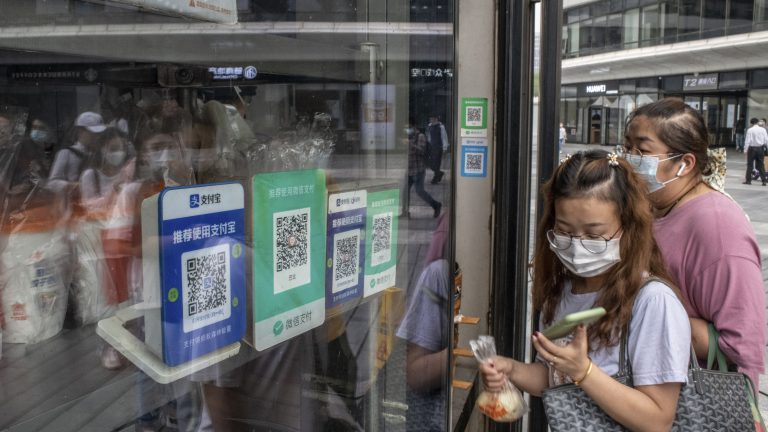In June, a Chinese student in California mentioned a taboo topic on WeChat: the government’s bloody 1989 crackdown on Tiananmen Square protesters. Hours later, his account was banned from WeChat, cutting him off from family and friends back home. To regain access to his account, Eric, who spoke to Rest of World under a pseudonym so he could discuss sensitive issues freely, was forced to write a heartfelt apology to Tencent, the messaging app’s parent company.
“I promise not to post anything in violation of laws and regulations to safeguard social stability and Tencent’s businesses,” Eric recalled writing in the 500-character letter, which he threw into a trash can later. “Thanks Tencent for providing us with such a good communication platform.”
Eric told Rest of World he did not believe any of what he had written in the note. But he did it because WeChat had ordered him to handwrite a letter admitting his guilt, along with a photo of him holding his Chinese national ID card, before it would return the account to him. “I was making things up against my own conscience,” Eric said. “You need to do everything they ask for in order to reactivate the account.”
Handwritten letters of apology aren’t exactly new. Parents and teachers often ask children to write that they’re sorry; even the police in China have been known to ask alleged criminals to pledge in a letter that they won’t repeat their past mistakes. But their use by digital platforms, including WeChat and microblogging site Weibo, has underscored the power these social media monopolies wield over ordinary citizens, as their products penetrate into all aspects of everyday life in the country.
WeChat is the dominant messaging app in China. Citizens depend on their WeChat accounts to not only communicate with each other, but also to order food deliveries, hail taxis, and pay for groceries. During the Covid-19 pandemic, people have been using WeChat to enter public venues — government-assigned QR codes must be scanned before people are allowed in.
Losing one’s WeChat account means getting cut off from social networks, digital wallets, and basic social services. That devastating experience, however, has become increasingly common as the social media app regularly shuts users out for transgressions ranging from spamming to criticizing the government. In October, WeChat banned a large number of accounts after their owners shared images of a rare protest against President Xi Jinping in Beijing, leaving the users scrambling to get back in touch with their friends, family, and work contacts.
WeChat accounts are so essential to people’s social and professional lives that users, after getting banned, are willing to go to great lengths to retrieve them. In some cases, the app asks users for handwritten apologies before unlocking their accounts, and the users have complied.





Xian Jingjing, a 21-year-old tech worker in the southwestern province of Sichuan, told Rest of World she was banned from WeChat in October 2021, after someone hacked into her account and posted spam messages from it. With the payment services disabled, Xian, then a university student, could not even go grocery shopping by herself.
After Xian appealed, Tencent’s customer service asked for a handwritten letter, which Xian drafted in her dorm room before carefully copying onto a separate piece of paper. “I really understand what I did wrong now. I regret it very much,” her letter read. “Really, please give me a chance. You all work so hard. Thank you!”
Like Eric, Xian also submitted a photo of herself holding her ID card. Her roommate, who took the picture for her, said it looked like a mug shot.
Another WeChat user in the central province of Hubei, who only gave her first name, Wenwen, due to privacy concerns, told Rest of World her account was suspended in September after she took on a part-time job posting advertisements in chat groups. She also had to write a letter to reactivate her account.
In the letter, the 22-year-old wrote that she had come to understand her wrongdoing, thanks to the teachings of Tencent’s customer service officers. Wenwen said the last time she had written such letters was in secondary school, when she was reprimanded for not paying attention in class.




Lotus Ruan, a researcher with the Citizen Lab at the University of Toronto, who has studied censorship on WeChat, told Rest of World these letters showed that social media companies are channeling the responsibility of conducting censorship onto individual users.
WeChat’s dominance in everyday life means users have little choice but to comply with whatever it asks for. “WeChat has become such an integral part of Chinese users’ life, not only for Chinese living in China, but also for a lot of overseas students and Chinese diaspora,” Ruan said. “If you have the account banned, then it’s like taking away a big part of your identity.”
Tencent declined Rest of World’s request for comment.
It’s unclear if every WeChat user is eligible to retrieve their banned account by writing a letter. Many others have struggled to even make their apologies heard. Following the wave of account shutdowns over the recent Beijing protest, for example, frustrated users flooded a Tencent hashtag on the microblogging site Weibo, begging the company to return their accounts. Internet users called the hashtag a “cyber confessional.”
Those who are unable to reactivate their accounts have resorted to registering new ones, and spending hours adding back the hundreds — or even thousands — of contacts, one by one. The fear of getting shut out of WeChat again has created a chilling effect, preventing people from having political discussions on the platform, according to users and researchers.
Besides WeChat, users of Weibo and Alibaba’s secondhand marketplace, Xianyu, have also submitted handwritten letters pledging not to violate their policies, in order to retrieve banned accounts, according to posts on social media platforms like Douyin, Xiaohongshu, and Bilibili. Weibo and Alibaba did not respond to requests for comments.
Eric’s letter eventually helped him get back on WeChat, where he communicates with his family in China and other Chinese students in America. He told Rest of World he regretted mentioning Tiananmen on the app, and said it should be a topic reserved for secure channels like Telegram or Signal.
On social platforms, many others have shared pictures of their handwritten letters, filled with remorse and gratitude. In a letter shared in 2021, one user said their WeChat account was banned for spamming others. “I have thoroughly understood the mistake I made. I feel really ashamed,” the person wrote. “I regret it very much. The brothers and sisters at customer service, I beg you please help me unlock it.”
Others took a more sentimental tone. “If I could turn back time, I would do my best to treasure [this account],” another person wrote, according to a picture of their letter shared on Xiaohongshu in June. “Please believe in a Communist Youth League member who has made a mistake. I’m sorry!!!”



